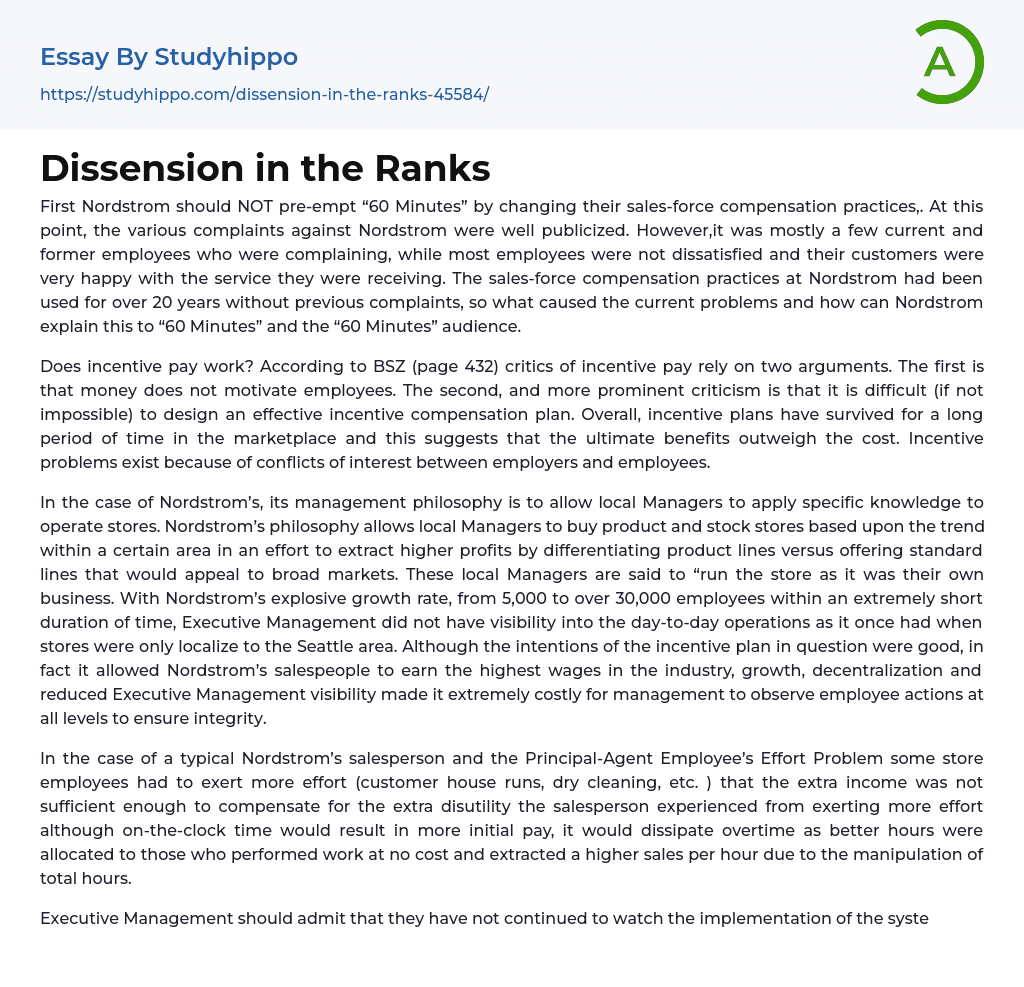In anticipation of the broadcast of "60 Minutes", Nordstrom should refrain from altering their sales-force compensation practices. Despite significant attention being given to complaints against Nordstrom, it is crucial to acknowledge that the discontent primarily comes from a minority of present and past employees. Most employees are content with their circumstances, and customers are highly satisfied with the service they receive. It is imperative to analyze the sources of these existing issues and devise strategies for addressing them when faced with "60 Minutes" and its viewership.
According to BSZ (page 432), critics of incentive pay question its effectiveness, citing two main arguments. The first argument is that money does not serve as a motivator for employees. The second, and more prevalent, criticism is that designing a successful incentive compensation plan is challenging, if not impos
...sible. However, incentive plans have endured in the marketplace for a considerable amount of time, indicating that the overall benefits outweigh the associated costs. Conflicts of interest between employers and employees contribute to the existence of incentive problems.
Nordstrom's management philosophy is to give local Managers the authority to run stores based on their expertise and knowledge. This allows them to make purchasing decisions and stock products according to the specific trends in their area, increasing profits by offering unique product lines rather than standard ones that cater to a broader market. These Managers have the freedom to "run the store as if it were their own business." However, as Nordstrom grew rapidly and expanded its workforce from 5,000 to over 30,000 employees within a short period of time, Executive Management lost visibility into day-to-day operations that was previously possibl
when stores were solely localized in Seattle. While the intention behind the incentive plan was positive, it led to Nordstrom's salespeople earning the highest wages in the industry. With growth and decentralization, it became increasingly challenging for management to effectively monitor employee behavior at all levels and ensure integrity.
In the case of a typical Nordstrom's salesperson and the Principal-Agent Employee's Effort Problem, some store employees had to exert additional effort (such as customer house runs and dry cleaning) without receiving sufficient extra income to compensate for the increased discomfort caused by increased effort. Although working more hours initially resulted in higher pay, this advantage disappeared over time as better hours were assigned to those who worked without compensation and achieved higher sales per hour through manipulation of total hours.
Executive Management needs to acknowledge that they have neglected the oversight of the system they previously introduced. They should also commit to examining and adjusting the sales-force management practices to better suit the company's current size. These adjustments will motivate the sales-force to maintain their exceptional customer service, closely monitor that no sales-force members work without compensation, and establish a system for tracking both sales and non-sales hours.
Additionally, Executive Management will offer further training to local managers in order to ensure the implementation of these newly introduced sales-force management practices. These practices will replace the previous method of unintentionally incentivizing employees to work off-the-clock. Nordstrom was legally obligated to compensate both current and former employees for the hours they were compelled to work without receiving proper payment.
Moreover, the court dismissed four out of five individuals involved in the Class Action lawsuit against Nordstrom.
Furthermore, the Union was warned to stop encouraging its members to work without compensation to support their case against Nordstrom. Shortly after settling, Nordstrom employees managed to revoke the Union's certification, resulting in Nordstrom no longer being a union shop. This extreme situation highlights how rapid company growth, decentralized management, and strict performance expectations can distort performance evaluation systems and lead to negative outcomes.
- Leadership and Management essays
- Change Management essays
- Project Management essays
- Knowledge Management essays
- Operations Management essays
- Quality Management essays
- Risk Management essays
- Scientific Management essays
- supply chain management essays
- Performance Management essays
- Time Management essays
- Brand Management essays
- Total Quality Management essays
- Risk essays
- Manager essays
- Leadership essays
- Business Ethics essays
- Board Of Directors essays
- Product Management essays
- Comparative Analysis essays
- Decision Making essays
- Dispute Resolution essays
- Stress Management essays
- Business Management essays
- Brand Equity essays
- Branding essays
- Nike, Inc. essays
- Market share essays
- Razor essays
- Being A Leader essays
- Servant Leadership essays
- Leadership Experience essays
- Leadership Qualities essays
- Incentive essays
- Advertising essays
- Audience Theory essays
- Competitor Analysis essays
- Consumer essays
- Marketing Management essays
- Marketing Mix essays
- Marketing Plan essays
- Marketing Research essays
- Marketing Strategy essays
- Point Of Sale essays
- Price essays
- Procurement essays
- Product essays
- Product Differentiation essays
- Promotion essays
- Promotion And Marketing Communications essays




